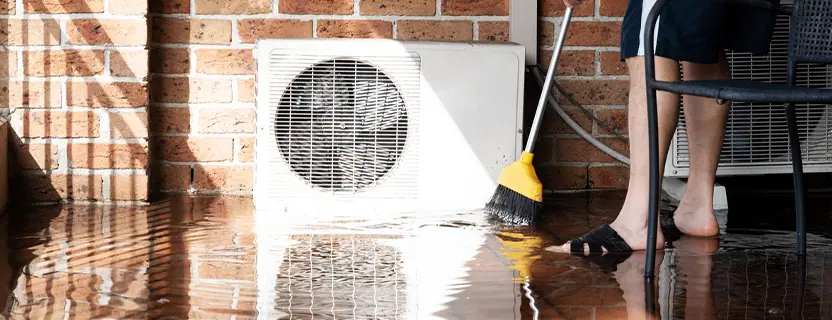
Living in the Southeast often means dealing with heavy rains and storms, especially in Florida. High winds and lots of water can quickly cause unexpected home issues.
With storms rolling through regularly, air conditioning (AC) flooding is a major concern for homeowners. AC flooding can lead to poor cooling, breakdowns and expensive repairs, affecting comfort. The Southeast’s high humidity and frequent downpours make understanding flooding essential. Let’s dive into AC units and how to tell if your system is flooded.
Rain on its own is unlikely to ruin your AC unit. Air conditioner units are designed to sit outside and are built to withstand common weather conditions, like precipitation. Falling rain will typically come down on your unit and drain away, letting your AC work effectively.
The real risk with rain is poor drainage or flooding. If water starts pooling around the unit, you might be in trouble. Once there’s enough water around your AC unit, it will seep into the case. With enough water in the case, the AC unit can corrode, experience electrical shorts or even fail.
Your risk of damage increases if storm debris clogs the vents or drain lines. Average rainfall shouldn’t affect your unit, but you need to keep an eye on it during storms or excessive downpours in case flooding starts.
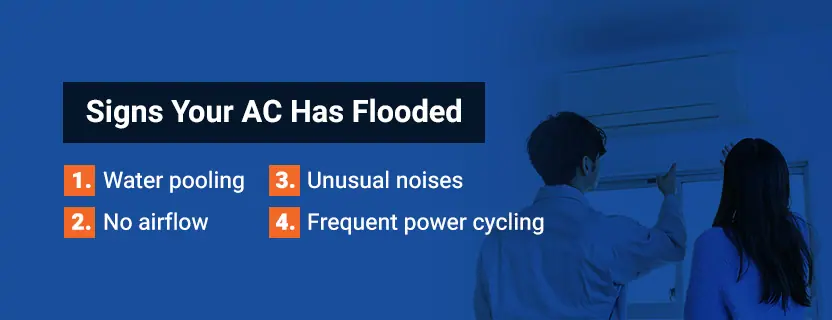
It’s not always obvious when your air conditioner has flooded, but catching the signs early can prevent further damage. Stay alert for flooding issues — they’re not always caused by rain. Sometimes, internal issues cause flooding inside the unit without you noticing. Keep an eye out for these signs in case you think you have flooding:
While rain is meant to drain away from your AC unit, sometimes it ends up flooded. Here are some possible causes:
If you’re dealing with a flooded air conditioner, you need to take action immediately. The longer your unit stays flooded, the worse the damage is likely to be.
While it may be tempting to handle the situation alone, you should always contact a professional for a flooded AC unit. Air conditioners need trained technicians to handle their internal issues and electrical components safely.
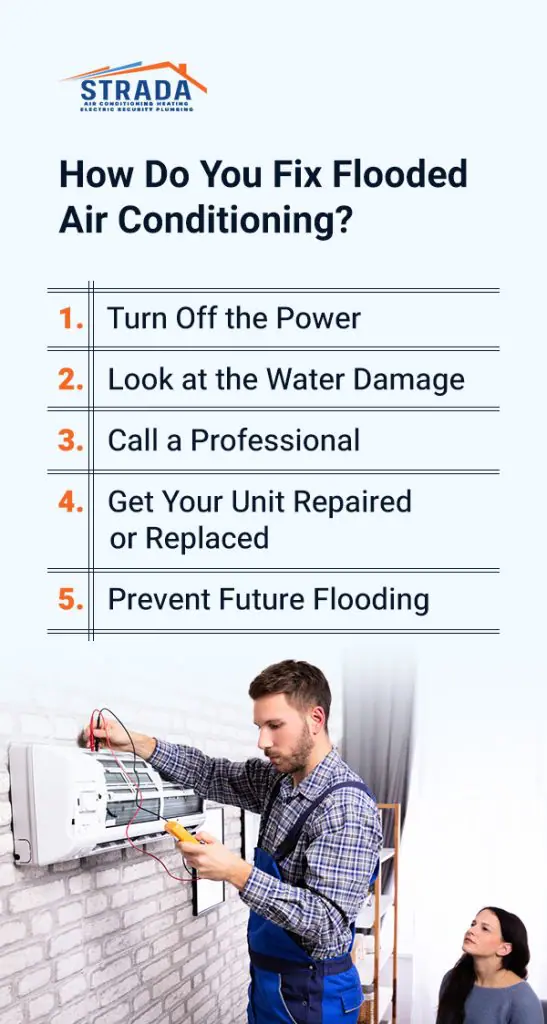
Here’s what you need to know about fixing a flooded air conditioner:
The first step in managing flooding damage is turning off your AC system. Water can cause electrical damage and unsafe conditions — turning off the unit stops electrical issues from getting worse. Go to your circuit breaker and power down the unit completely. You won’t get to the main power source if you just shut off the thermostat.
Flooding often leads to moisture getting inside the electrical components. Water can lead to dangerous electrical shorts or fire hazards, risking your safety. Turning off the power protects you and your home from hazards until a professional can arrive.
If you can, visually inspect your unit. You can get a good idea of the water damage before calling a technician. Is water only pooled around the AC unit, or has it entered the AC cabinet? Did you hear any unusual sounds before you shut off the power? How high is the water? This information can help the AC technician know what they’re working with when they arrive.
Remember, figuring out internal damage without the right tools is difficult. That’s why you need a professional to check over everything.
Once the AC is off, it’s time to call an expert heating, ventilation and air conditioning (HVAC) technician. While you might be able to handle minor AC issues on your own, flooding is a severe problem. Flooded units need thorough inspections since water can sneak into every crevice. An HVAC technician will:
Flooding might not have damaged your AC unit at all. However, it’s likely your system will need repairs or replacements. Technicians can fix flooded air conditioners by replacing damaged components.
Often, replacing parts and performing minor repairs can get your system working. If your AC has more extensive damage, you might need to replace the entire unit.
Replacing a flooded AC unit can often be more cost-effective for homeowners, especially if the AC is older. You should replace your air conditioner every 10 years to avoid efficiency issues.
If your flooded AC is around or past this age, then a replacement is going to give you the best value in the long term. An experienced HVAC technician will help you decide on the best choice for your home and budget.
Once your AC is working again, take steps to prevent future flooding. Dealing with a flooded unit is stressful and potentially expensive — the less you have to deal with flooding, the better.
Consult your technician about the best flood-prevention practices for your AC unit. They might recommend the following:
No, you shouldn’t cover your air conditioner most of the time. While it might seem like a good way to protect it from the rain, your AC unit needs to be open to the air. Covering your unit can trap moisture inside, leading to rust, mold and electrical issues. If you’re in a milder climate, like Florida, it’s safe to leave your AC unit uncovered most of the time.
However, you can use a temporary cover if you’re expecting a major storm or lots of debris. These can help prevent flooding, protecting your AC unit from water damage. If you use a temporary cover, remember to remove it after the storm. Leaving it on can lead to the same long-term damage mentioned above.
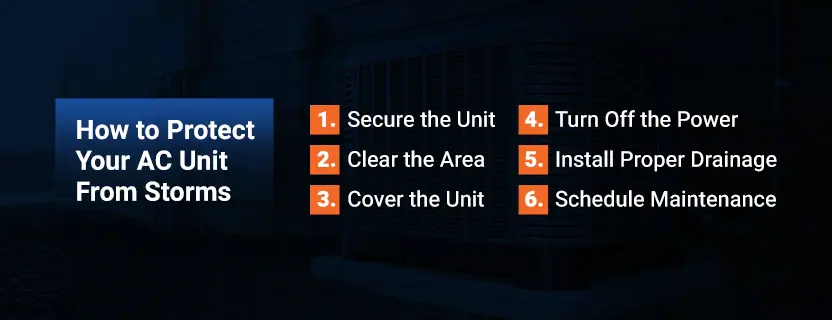
Stormy weather can put your AC at risk. Heavy rains, high winds and flying debris can damage your unit, especially during severe storms. While your AC unit is built to handle normal outdoor conditions, taking extra precautions can protect your system. Here’s how to protect your AC unit from storms so it can keep working smoothly.
Securing your AC unit is one of the most important steps. Most AC units are heavy, but hurricane-force winds can be powerful enough to move them or cause damage. Use hurricane straps or bolted brackets to anchor your unit to the concrete pad. These tools will help secure your unit in place, making it harder for winds to move it.
Storms can turn tree branches and debris into projectiles. Trim nearby trees and bushes to protect your AC unit from projectile damage during the storm. Make sure to remove any loose yard items as well.
Strong winds can pick up potted plants, lawn furniture and yard tools from the yard. If these hit your home or AC unit, they can cause damage. Store these somewhere secure to keep them from flying around in high winds.
If a major storm is on the way, you can temporarily cover the AC unit with a tarp or sturdy cover. Secure waterproof coverings can give your unit extra protection from debris and rainfall.
Remember to remove the cover after the storm to keep your AC unit properly ventilated. While covers might not protect your unit from significant flooding, they can keep out heavier rain.
Before a severe weather event hits, turn off your air conditioner’s power. Head to the circuit breaker and shut the power off to prevent electrical surges. Lightning storms and power outages can cause surges, which might damage your unit’s electrical components. If your components get damaged, you’ll need a professional to restore their function.
Additionally, flooding will further damage electrical components if you leave the power on. Having the AC power off helps prevent safety hazards during and after storms. Surge protection can also help protect your AC unit from electrical damage. These products shield your electrical components from sudden voltage spikes. You can directly install surge protectors onto your HVAC system to get extra electrical protection during storms.
When storms cause flooding, it can quickly cause problems for your AC unit. Make sure your home has proper drainage around the AC unit to keep water from sticking around. If your unit is installed in a low-lying area, you might need additional drainage or an elevated platform.
The higher up your AC unit and the better your yard’s drainage, the harder it is to flood the area. Also, keep your AC drain lines clear of debris to prevent backups that can flood the system.
Routine maintenance is a great way to minimize storm damage. Having a professional HVAC technician inspect your system before storm season can prevent major issues.
Technicians can catch issues like clogged drain lines and electrical problems before they make storm recovery worse. They’ll keep your system in optimal condition so it’s working at its best before bad weather hits.
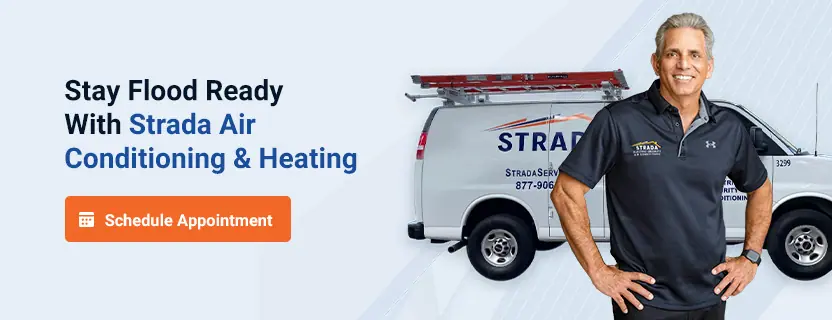
At Strada Air Conditioning & Heating, we understand how important a well-functioning AC system is. Dealing with scorching Southern summers and heavy rains means you need your AC working at its best at all times.
Whether you need routine maintenance, repairs, or a complete replacement, our expert team is here to help. We service all major brands and provide tailored solutions for central and ductless air conditioning systems.
Why choose Strada? Our family-owned company has been delivering trusted service since 2003. Work with us and enjoy convenient online scheduling, energy-efficient solutions and 24/7 emergency support. With expert technicians and a 10-year labor warranty, we provide cooling services you can rely on.
Schedule an appointment today.